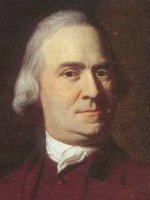“An attempt was made against Mr. S. Adams”
I already described one story behind Boston’s vote for representatives to the Massachusetts General Court in 1772: the replacement of James Otis, Jr., after too many episodes of insanity.
The other story appeared in a posthumous volume of Gov. Thomas Hutchinson’s History of the Province of Massachusetts Bay.
Hutchinson had convinced himself that a rift was opening between Samuel Adams and John Hancock that year. He even fancied that he could peel Hancock away from the local Whigs with favors like appointing him colonel of the province’s most prestigious militia company, the Cadets, and approving his election to the Council.
Hutchinson also felt that Adams was losing popularity with voters. His take on the election of May 1772 was:
Over 150 people cast votes for Adams’s colleagues without voting for him. In previous years, Adams’s percentage had come much closer to all votes cast. Without troops in town, new taxes, or other irritants, he was having trouble convincing Bostonians they needed to push hard against the royal government.
Still, Adams won 70% of the vote at that town meeting, obviously enough to remain in office. It’s not clear who was next runner-up, or even if there was a candidate that the friends of the royal government put their weight behind. But obviously, if every voter could list four names, he didn’t come close to matching Adams’s 505 votes.
I can’t help but think that Hutchinson was fooling himself about his strength in the colony’s popular politics. Royal appointees were always too convinced that “a considerable proportion of the people” was really on their side.
The other story appeared in a posthumous volume of Gov. Thomas Hutchinson’s History of the Province of Massachusetts Bay.
Hutchinson had convinced himself that a rift was opening between Samuel Adams and John Hancock that year. He even fancied that he could peel Hancock away from the local Whigs with favors like appointing him colonel of the province’s most prestigious militia company, the Cadets, and approving his election to the Council.
Hutchinson also felt that Adams was losing popularity with voters. His take on the election of May 1772 was:
It was apparent that, even in Boston, a considerable proportion of the people were still in favour of government [i.e., the Crown]. No opposition had been made for several years past to the election of members in that town; but in May, 1772, an attempt was made against Mr. S. Adams, and it appeared, upon trial, that near one-third of the votes were against him.By “near one-third of the votes,” a footnote showed, Hutchinson meant “218 in 723.” (His total differed from the official count in William Cooper’s minutes, which was 728.)
Although this attempt shewed that a strong party was still left which disapproved the measures of opposition, it proved a disservice to government. It caused an alarm, and a more vigorous exertion; and no endeavours were spared to heal all breaches in the opposition, and to guard against a renewal of them. The friends both of Mr. Hancock and Mr. Adams never ceased, until they had brought about a reconciliation.
Over 150 people cast votes for Adams’s colleagues without voting for him. In previous years, Adams’s percentage had come much closer to all votes cast. Without troops in town, new taxes, or other irritants, he was having trouble convincing Bostonians they needed to push hard against the royal government.
Still, Adams won 70% of the vote at that town meeting, obviously enough to remain in office. It’s not clear who was next runner-up, or even if there was a candidate that the friends of the royal government put their weight behind. But obviously, if every voter could list four names, he didn’t come close to matching Adams’s 505 votes.
I can’t help but think that Hutchinson was fooling himself about his strength in the colony’s popular politics. Royal appointees were always too convinced that “a considerable proportion of the people” was really on their side.


4 comments:
I’m afraid nothing further can be said in regards to Thomas Hutchinson other than nothing further should be said in regards to Thomas Hutchinson. May his name be forgotten and his place in history ignored.
Forgetting or ignoring an important historical figure in an important historical period? No, that's not how the discipline works.
"Royal appointees were always too convinced that “a considerable proportion of the people” was really on their side."
Are these the ancestors of the people who evolved in Richard Nixon's 'Silent Majority"?
I think a better analogy would be to the right-wing pundits who insisted in 2012 that all the polls showing President Obama winning were "skewed," and then were flabbergasted when he won just the way most of those polls showed.
After all, Nixon actually did win a big majority in 1972.
Post a Comment